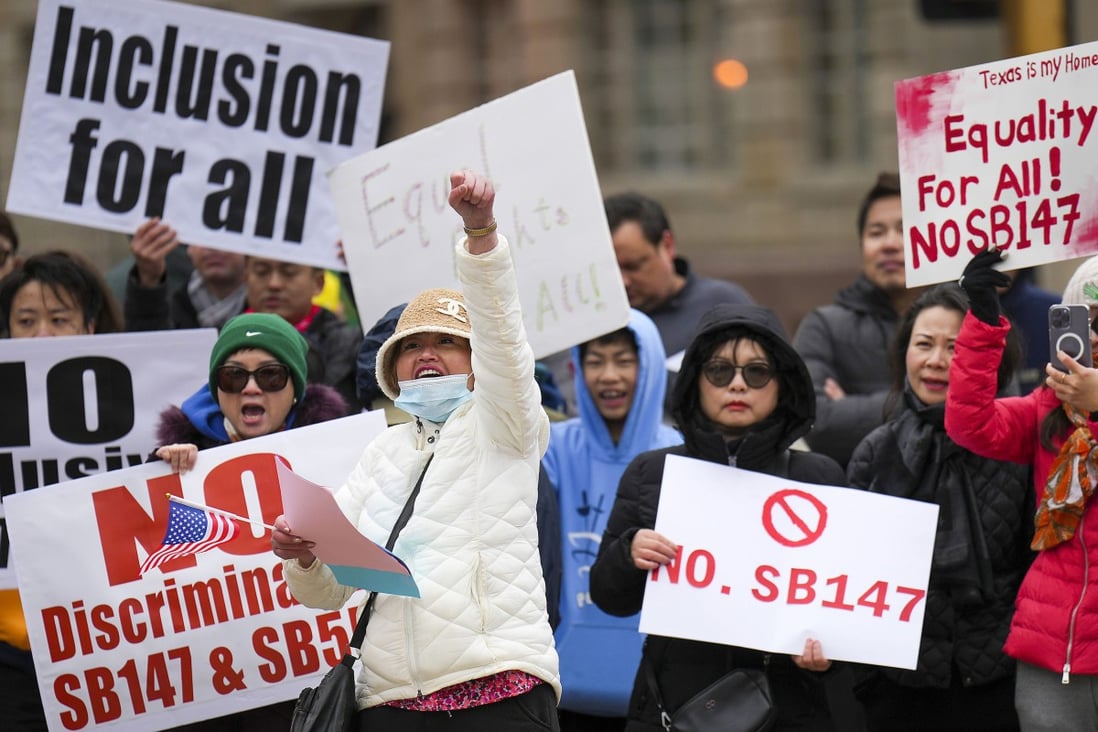Proposed Texas ban on Chinese home ownership grounded in nothing but hate
By Leo Yu
South China Morning Post
February 1, 2023

In the past week, Chinese-Americans in Texas have been busy. They have organised several rallies in Austin, Houston, and Dallas. Hundreds of people showed up, holding banners bearing one simple message: Say No to SB 147.
Senate Bill 147, introduced by Senator Lois Kolkhorst, prohibits both entities and citizens of four countries – China, North Korea, Iran and Russia – from owning real estate in Texas. The most controversial part of the bill is that it does not provide any exception for foreign citizens who live in Texas with a valid visa or green card, which denotes permanent resident status.
On January 25, Kolkhorst announced that, despite the protests, she would still push through this bill because she wanted to “do something to protect Texans and our national security”. She did promise, however, to amend the bill, making an exception for green card holders. She did not provide a timeline for the amendment or elaborate on any substantive national security concern.
Kolkhorst’s promise does not matter, because the amendment would not change the racist nature of this bill, which reflects the racial bias and nationalism deeply embedded in US history.
Banning immigrants, especially Asians, from land ownership is nothing new in America. California enacted the Alien Land Law in 1913, restricting land ownership to “aliens eligible to citizenship”, which was an intentional effort to preclude Asians from owning properties.
The Alien Land Law responded to the anti-Asian sentiment in the 1800s and 1900s, rooted in white supremacy and orientalism. Asians were perceived as perpetually foreign, unable to assimilate culturally to white society, and an economic threat to white labourers. Eventually, 15 states, including Texas, adopted similar laws that banned Asian immigrants from owning real properties.

There is no meaningful distinction between Senate Bill 147 and the Alien Land Law; the new bill expressly bans property ownership by immigrants, mostly Asians. The national security concern, in this case, only serves as a disguise.
Once passed, individuals from the four designated countries will not be able to purchase any land in Texas, from a town house in Dallas, to a bakery in Laredo. There is no reasonable argument to be made that such an extremely broad ban would benefit national security in any way.
Meanwhile, the largest oil refinery in Texas is still owned by Saudi Arabia, but Saudi Arabia is nowhere to be found in any of the bill’s sections.
SB 147 is simply a manifestation of the Texas Republican Party’s anti-China xenophobia. To many voters, this is about America versus China. China is the enemy; therefore, the Chinese must also be bad, as they are all potential agents of the Chinese Communist Party. They will never become us. While we are capable of differentiating ourselves from our government or political party, the Chinese simply cannot. Once Chinese, always Chinese, always Chinese Communist Party.
The root of such anti-China sentiment is complex, as it is embedded with orientalism, just as it was in 1913, but also justified by legitimate concerns over China’s aggression today. Nevertheless, a blind attack on China and the Chinese as a whole is not the answer to these concerns. All it does is amplify racism towards the Chinese, citizens and non-citizens alike.
The most recent evidence of this is the failed China Initiative of Donald Trump’s Justice Department. Few defendants charged under the initiative were found to have engaged in espionage. Many of them, including prominent STEM scholars, became victims of racial profiling. The China Initiative has created irreparable harm to the American science academy.
Asians should not be distracted by Kolkhorst’s amendment. Citizenship or residency has never served as a meaningful safeguard against racism. It did not save the Japanese from mass incarceration during World War II; it did not exempt American Muslims from governmental surveillance after the September 11 attacks; and it did not prevent Asian Americans from being the targets of hate crimes during the Covid-19 pandemic.
For those who frequently engage in US-China business, you should pay attention. SB 147 is not a Texas issue only. It reflects an increase in anti-China sentiment on a national level, and it will only get nastier in the coming presidential race.
Governor Ron DeSantis is considering adopting a similar law in Florida. House Speaker Kevin McCarthy has created a China Committee, vowing that “the era of trusting Communist China is over”. Senator for Arkansas Tom Cotton said there should be a national ban on TikTok. The anti-China list is growing rapidly all over America.
Perhaps, it is time to acknowledge the reality: the Chinese are not welcome in Texas, and in many other places in today’s America.
Leo Yu is a clinical professor of law at the SMU Dallas Dedman School of Law
EDITOR'S NOTE: SB 147 reminds me of the 1938 Nazi Decree on the Confiscation of Jewish Property which transferred the property of Jews to non-Jews in Germany.
If SB 147 reaches Gov. Abbott's desk and he signs it into law ... its Heil Abbott Hitler.
6 comments:
Fox News: Experts sound alarm over China buying US land near military bases: 'Chilling'
China has increased their holdings of farmland outside of China by 1,000%.
Governor Abbott Announces Statewide Plan Banning Use Of TikTok
February 6, 2023 | Austin, Texas | Press Release
Governor Greg Abbott today announced a statewide model security plan for Texas state agencies to address vulnerabilities presented by the use of TikTok and other software on personal and state-issued devices. Following the Governor's directive, the Texas Department of Public Safety and the Texas Department of Information Resources developed this model plan to guide state agencies on managing personal and state-issued devices used to conduct state business. Each state agency will have until February 15, 2023 to implement its own policy to enforce this statewide plan.
“The security risks associated with the use of TikTok on devices used to conduct the important business of our state must not be underestimated or ignored,” said Governor Abbott. “Owned by a Chinese company that employs Chinese Communist Party members, TikTok harvests significant amounts of data from a user’s device, including details about a user’s internet activity. Other prohibited technologies listed in the statewide model plan also produce a similar threat to the security of Texans. It is critical that state agencies and employees are protected from the vulnerabilities presented by the use of this app and other prohibited technologies as they work on behalf of their fellow Texans. I thank the Texas Department of Public Safety and Texas Department of Information Resources for their hard work helping safeguard the state’s sensitive information and critical infrastructure from potential threats posed by hostile foreign actors.”
To protect Texas’ sensitive information and critical infrastructure from potential threats, the model plan outlines the following objectives for each agency:
Ban and prevent the download or use of TikTok and prohibited technologies on any state-issued device identified in the statewide plan. This includes all state-issued cell phones, laptops, tablets, desktop computers, and other devices of capable of internet connectivity. Each agency’s IT department must strictly enforce this ban.
Prohibit employees or contractors from conducting state business on prohibited technology-enabled personal devices.
Identify sensitive locations, meetings, or personnel within an agency that could be exposed to prohibited technology-enabled personal devices. Prohibited technology-enabled personal devices will be denied entry or use in these sensitive areas.
Implement network-based restrictions to prevent the use of prohibited technologies on agency networks by any device.
Work with information security professionals to continuously update the list of prohibited technologies.
In December 2022, Governor Abbott directed state agency leaders to immediately ban employees from downloading or using TikTok on any government-issued devices. The Governor also informed Lieutenant Governor Dan Patrick and Speaker Dade Phelan that the Executive Branch is ready to assist in codifying and implementing any necessary cybersecurity reforms passed during the current legislative session, including passing legislation to make permanent the Governor’s directive to state agencies.
Governor Abbott has taken significant action to combat threats to Texas’ cybersecurity, including signing the Lone Star Infrastructure Protection Act in 2021 to fortify certain physical infrastructure against threats that include hostile foreign actors.
Trey, I've always liked Gov. Abbott and supported him, but what you say does not change the fact that SB 147 is a horrible Nazi-like bill.
If you can't respond to the actual argument, call it "Nazi like." That's been working for the left for decades now in this country.
Dave, it is what it is. The Nazis did it to the Jews and SB 147 would do it to the Chinese.
The Nazi's didn't have satellite communication, internet or spy hacking techniques that are used today. Anything is on the table to save this country from spying. Texas isn't the only state taking precautions against spying. Grand Forks, ND city council unanimously blocked China interests from purchasing a corn mill factory near a Military Base. That vote cost Grand Forks a lot of money and jobs. They did it out of a love for the U.S. and I applaud them. The US has been doing the same thing for decades. Remember the U-2 incident during the Cold War. Howie, the catch phrase, "It Is What It Is." doesn't apply here because of new technology.
Post a Comment